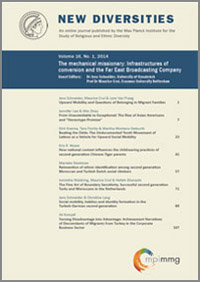How National Context Influences the Childrearing Practices of Second-Generation Chinese Tiger Parents
by Kris R. Noam (University of California, Irvine)
To cite this article: Noam, K. R. (2014). How National Context Influences the Childrearing Practices of Second-Generation Chinese Tiger Parents. New Diversities, 16(1), 41–55. https://doi.org/10.58002/k2zj-vy35
Amy Chua’s 2011 memoir evoked heated debate on the childrearing practices of Chinese ‘Tiger Mothers’ and on how some Chinese ethnocultural values can push children toward academic success. To date, little scholarly attention has been paid to the childrearing practices of second-generation Chinese or to how they may influence this part of their children’s assimilation. I conducted in-depth interviews with second-generation Chinese parents in the United States and the Netherlands in order to examine specific ethnocultural socialization techniques that could boost children’s academic outcomes. Findings show that national context—focusing on different school systems and social security safety nets—can act as an intervening variable by affecting the intergenerational transmission of ethnocultural values regarding educational expectations and academic outcomes. U.S.-born Chinese parents continue to channel their offspring towards high educational achievement, while their peers born in the Netherlands instead emphasize the importance of their children’s free choice and their happiness.
Keywords: second-generation, assimilation, childrearing, cultural transmission, cross-national
|
